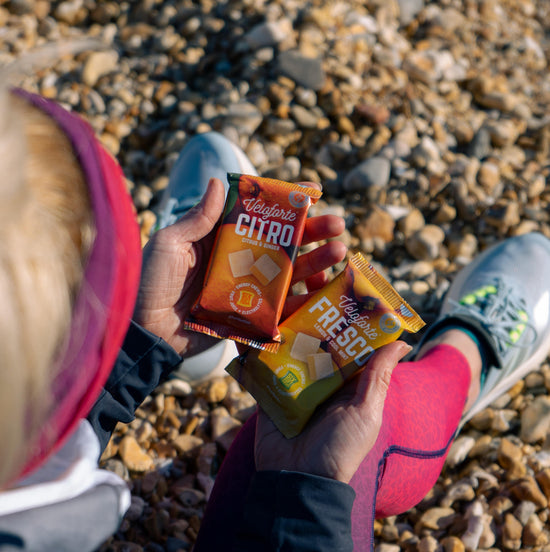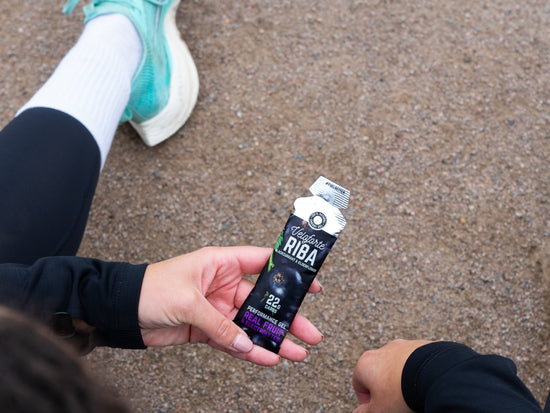Embarking on the journey of marathon is a monumental endeavour that requires dedication, perseverance, and careful planning. Among the many factors that contribute to marathon success, nutrition stands out as a critical component. Proper fuelling can make all the difference in maintaining energy levels, preventing fatigue, and optimising performance throughout the 26.2-mile journey so that you can successfully cross that finish line.
In this comprehensive guide, we'll delve deep into marathon training, nutrition, exploring how many carbohydrates you should consume during a marathon, the best products for fuelling, when to take them, and practical strategies for incorporating them into your training and race day plans.
Understanding Carbohydrate Needs When Marathon Training
Energy chews have quickly become a staple in the sports nutrition industry, but what exactly are they? Simply put, they are small, chewy bites that are packed with carbohydrates, electrolytes, and sometimes caffeine. These ingredients work together to provide a quick energy boost during physical activity, helping to prevent fatigue and improve endurance.
Carbohydrates are the body's primary source of energy, particularly during prolonged endurance activities like marathon running. When you run, your muscles rely on glycogen stores to fuel your efforts. As these stores become depleted, fatigue sets in, leading to a decline in performance. To sustain energy levels and prevent hitting the dreaded "wall," it's essential to consume an adequate amount of carbohydrates before, during, and after the race.
The British Journal of Sports Medicine recommends that endurance athletes consume 0.7g of carbohydrates per kilogram of body weight per day to maintain glycogen stores. During a marathon, aim to consume approximately 30-60 grams of carbohydrates per hour, depending on factors such as body size, intensity of effort, and individual tolerance.
Best Products for Fuelling Marathon Training and Race Day
Energy Gels
Energy gels are portable, convenient packets of concentrated carbohydrates designed to provide a quick source of energy during exercise. Typically containing around 20-25 grams of carbohydrates per serving, gels are easily digestible and can be consumed without water, making them ideal for on-the-go fuelling during a marathon.
Veloforte’s Energy Gels contain 22g of all natural, dual-source carbohydrates (glucose & fructose) providing maximal energy absorption and sustained energy release. They also contain natural electrolytes from pink Himalayan sea salt and freeze dried coconut water to provide both sodium and potassium to help maintain fluid balance and replace lost minerals.
Energy Chews
Energy chews are melt in the mouth, bite-sized snacks that are high in carbohydrates as well often electrolytes and vitamins. They offer a convenient alternative to energy gels and can be consumed gradually over time, allowing for more controlled energy release.
Veloforte’s Energy Chews contain over 40g of carbohydrates per pack. Hand-made with real fruit and natural electrolytes, they’re optimally balanced to energise and replenish your body.
With 6 chews per pack we recommend consuming 2 chews every 20 minutes to maintain energy levels to hit your hourly carbohydrate goal.
Electrolyte Drinks
Electrolytes such as sodium, potassium, and magnesium are lost through sweat during prolonged exercise and play a crucial role in maintaining fluid balance and muscle function. Electrolyte drinks, available in powder or liquid form, provide a convenient way to replenish these essential minerals while also supplying carbohydrates for energy. Aim to consume electrolyte drinks at aid stations throughout the marathon course to stay hydrated and maintain electrolyte balance.

Quick to absorb and refreshingly light, Veloforte’s hypotonic electrolyte powders contain no fillers or effervescents. Just nature’s finest coconut water infused with pink Himilayan salt and real fruit to lock in all the natural vitamins and minerals you need. Crafted to replenish, rebalance and re-energise the body effectively.
When to Energise During a Marathon
Timing is key when it comes to fuelling during a marathon. To avoid hitting the dreaded "wall" and maintain steady energy levels throughout the race, it's important to start fuelling early and consistently. Here's a suggested fuelling strategy:
Pre-Race
Consume a carbohydrate-rich meal 2-3 hours before the race to top off glycogen stores and provide sustained energy. This could include oatmeal, whole grain toast, fruit, yoghurt with a Veloforte Oat Snack Bar or a Veloforte energy bar.
During the Race
Start fuelling from the off to prevent glycogen depletion. Consume an energy gel or some energy chew every 20 to 30 minutes, along with sipping on an electrolyte drink. Be careful to not over hydrate which can lead to hyponatremia which causes mineral balances in the body to become lower than normal.
Post Race
You want to replenish lost glycogen stores with a carbohydrate rich snack or meal that is also high in protein to aid with muscle recovery. Aiming to consume this snack or meal within 30 minutes of finishing is optimum. Veloforte’s Recovery Super-Shakes Nova and Vita contain the optimal 3:1 ratio of carbs and protein to quickly restore muscles and optimise recovery. Nova was voted Runner's World best recovery drink for runners with Vita closely following in second.
Be race day ready with our marathon nutrition pack
You've done the hard training miles and now race day is approaching! Whatever event you're doing, get to the start line feeling confident with the very best nutrition in your pocket. We've curated everything you need for before, during and after your race, to give you the very best energy boost, motivating flavours and all the carbs and electrolytes you need to power you to the finish line.
Incorporating Nutrition into Your Marathon Training Plan
Fuelling for a marathon isn't just about what you consume on race day; it's also about how you fuel your body during training. Incorporating nutrition into your marathon training plan can help you optimise performance, recover more effectively, and prevent injuries. Here are some practical tips for integrating nutrition into your training regime:
Practice Your Race Nutrition Plan
Use your long training runs as an opportunity to test different fuelling products and strategies. Experiment with energy gels, chews, and electrolyte drinks to determine what works best for your body and how often you need to refuel.
Hydrate Properly
With just a 5% drop in hydration resulting in up to a 30% decrease in performance hydration is just as important as fuelling when it comes to marathon training. Aim to drink water consistently throughout your runs, and consider using electrolyte drinks for longer workouts to replenish lost minerals. Pay attention to your body's thirst cues and adjust your fluid intake accordingly.
Plan Your Pre and Post Run Meals
What you eat before and after your training runs can have a significant impact on your performance and recovery. Prioritise complex carbohydrates, lean proteins, and healthy fats in your pre-run meals to provide sustained energy. After your run, refuel with a combination of carbohydrates and protein to replenish glycogen stores and support muscle repair.
Listen To Your Body
Every runner is different, so it's essential to listen to your body and adjust your nutrition plan accordingly. If you're feeling fatigued or sluggish during your runs, experiment with different fuelling and hydration strategies to see if they make a difference. Pay attention to how your body responds to different foods and products, and make adjustments as needed
Race Day Nutrition
On race day, all your training and preparation come down to execution. Following a well-thought-out nutrition plan can help you perform at your best and achieve your marathon goals. Here's how to put it all together on race day:
Start the day with a balanced breakfast that includes complex carbohydrates, lean proteins, and healthy fats to fuel your body for the long haul.
Consume a carbohydrate-rich snack or meal 2-3 hours before the race to top up glycogen stores and provide sustained energy.
During the race, start fuelling early and consistently, aiming to consume 30-60 grams of carbohydrates per hour.
Use a combination of energy gels, energy chews, and electrolyte drinks to maintain energy levels and prevent dehydration.
Listen to your body's cues and adjust your fuelling and hydration strategy as needed throughout the race. If you start to feel fatigued or depleted, don't hesitate to refuel and hydrate more frequently.
Recover Stronger
Recovery after a marathon is just as important as fueling during the race itself. In the hours and days following your race, your body will undergo significant stress and damage from the intense physical exertion. Proper recovery nutrition plays a crucial role in replenishing depleted glycogen stores, repairing muscle damage, and promoting overall recovery.
One widely recommended approach is to consume a post-race meal or snack with a 3:1 ratio of carbohydrates to protein. This optimal ratio helps to replenish glycogen stores while also providing the necessary amino acids to support muscle repair and growth.
A balanced post-race meal might include options such as a turkey sandwich on whole grain bread, Greek yoghurt with fruit and granola, or a protein smoothie made with fruit, Veloforte’s Protein Super Shake, and almond milk.
Additionally, hydrating adequately and including sources of electrolytes, such as Veloforte’s electrolyte powders, in your post-race recovery plan can help restore fluid balance and support muscle function. Taking the time to prioritise proper recovery nutrition will not only enhance your recovery process but also set the stage for future training and racing success.











